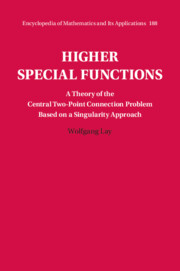 Higher Special Functions
Higher Special Functions Published online by Cambridge University Press: 16 May 2024
Singularities are central to treating the boundary eigenvalue problems in this book, both singularities of differential equations and those of their solutions. Poincaré was probably the first to recognise their importance and treat them conceptually, by introducing what he called the rank. However, I have chosen a slightly different definition, introducing the ’singularity’ s-rank. With this definition, the non-elementary regular singularity is standard, with s-rank 1. Given this concept, the singularities of our treated differential equations always have half-integer s-rank, because of the order (2) of the underlying differential equation. Moreover, regular and irregular singularities are distinguished, for s-rank larger than 1 or not. There are two types of regular singularities – s-rank 1 and s-rank 1/2 – the latter called elementary singularities. Among the irregular singularities are those having integer s-rank and odd half-integer s-rank. The irregular singularity whose s-rank is smallest is R = 3/2. The standard singularity is not – as with Poincaré – the elementary one, but the non-elementary regular singularity of the underlying differential equation with s-rank 1.
To save this book to your Kindle, first ensure no-reply@cambridge.org is added to your Approved Personal Document E-mail List under your Personal Document Settings on the Manage Your Content and Devices page of your Amazon account. Then enter the ‘name’ part of your Kindle email address below. Find out more about saving to your Kindle.
Note you can select to save to either the @free.kindle.com or @kindle.com variations. ‘@free.kindle.com’ emails are free but can only be saved to your device when it is connected to wi-fi. ‘@kindle.com’ emails can be delivered even when you are not connected to wi-fi, but note that service fees apply.
Find out more about the Kindle Personal Document Service.
To save content items to your account, please confirm that you agree to abide by our usage policies. If this is the first time you use this feature, you will be asked to authorise Cambridge Core to connect with your account. Find out more about saving content to Dropbox.
To save content items to your account, please confirm that you agree to abide by our usage policies. If this is the first time you use this feature, you will be asked to authorise Cambridge Core to connect with your account. Find out more about saving content to Google Drive.